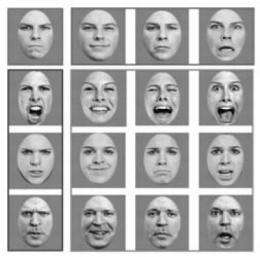Research shows that some features of human face perception are not uniquely human

When it comes to picking a face out of a police lineup, would you guess that you would use some of the same processes a pigeon might use?
If you said "yes," then you're right.
A study published by two University of Iowa researchers in the March 31 issue of the Journal of Vision found that pigeons recognize a human face's identity and emotional expression in much the same way as people do.
Pigeons were shown photographs of human faces that varied in the identity of the face, as well as in their emotional expression -- such as a frown or a smile. In one experiment, pigeons, like humans, were found to perceive the similarity among faces sharing identity and emotion. In a second, key experiment, the pigeons' task was to categorize the photographs according to only one of these dimensions and to ignore the other. The pigeons found it easier to ignore emotion when they recognized face identity than to ignore identity when they recognized face emotion, according to Ed Wasserman, Stuit Professor of Experimental Psychology, and graduate student Fabian Soto, both of the UI College of Liberal Arts and Sciences Department of Psychology.
"This asymmetry has been found many times in experiments with people and it has always been interpreted as the result of the unique organization of the human face processing system." Soto said. "We have provided the first evidence suggesting that this effect can arise from perceptual processes present in other vertebrates.
"The point of the project is not that pigeons perceive faces just as we do or that people do not have specialized processes for face perception. Rather, the point is that both specialized and general processes are likely to be involved in peoples' recognition of faces and that the contributions of each should be carefully determined empirically," he added.
In fact, the findings could make scientists reconsider their assumptions about how uniquely human cognitive processes might interact with more general processes in complex tasks such as face recognition.
"It is a popular practice among researchers in perception and cognition to speculate about specialized mechanisms without offering convincing empirical data to support their ideas. We hope that our research will prompt other researchers to conduct more comparative work to assess their claims about the evolution of uniquely human perceptual and cognitive processes," Wasserman said.
The researchers studied pigeons in this project because they have excellent vision and are not close evolutionary relatives of humans. Pigeons do not have a specialized system for face processing, but they still show similarities to people when they are trained to recognize human faces. The simplest interpretation of these similarities is that they result from general recognition processes shared by both species.
More information: www.journalofvision.org/content/11/3/24.full
Provided by University of Iowa













